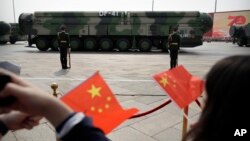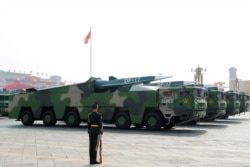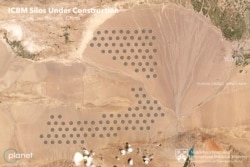American officials say they are concerned at how quickly China is strengthening its military power in a wide range of areas.
The officials say China is continuing to build up its nuclear weapons program, along with its space, cyber and missile technologies.
Air Force General John Hyten is the number two ranking U.S. military official. He told The Associated Press that he finds the rate at which China is moving “stunning.”
The growth comes as China’s government has increased its military activities around Taiwan, which Beijing considers a rebel territory. China has said it plans to one day reclaim the territory and would use force if necessary.
China’s military expansion is seen as an effort to change a world balance of power that has long favored the United States. If China becomes more powerful, that may not be a direct threat to the U.S. But it could change American alliances in Asia. New signs of how Washington deals with China may come out in the coming weeks as Joe Biden’s administration reviews its defense policy.
The latest example of China’s fast growth was the country’s recent test of a hypersonic weapon. The weapon is able to partly orbit Earth before reentering the atmosphere and heading toward a target.
General Mark Milley is chairman of the Joint Chiefs of Staff, the highest-ranking U.S. military official. He called the test “very concerning” for the United States.
Milley said the hypersonic weapon test was “very close” to being what he called a Sputnik moment. He was speaking about an event in 1957 in which the Soviet Union surprised the world by launching the world’s first space satellite. The event led to a nuclear arms and space race between the U.S. and the Soviet Union.
But Milley added that the problems presented by China's military modernization go much further. “That’s just one weapon system,” he recently told Bloomberg Television. "The Chinese military capabilities are much greater than that.”
Satellite images in recent months have also shown that China has built more launch silos for its nuclear missiles.
An important driver of China’s growth in nuclear weapons is its concerns about possible U.S. actions, says Fiona Cunningham. She is a professor of political science at the University of Pennsylvania. She told the AP she thinks China’s nuclear growth could limit the effectiveness of a possible first U.S. strike against Chinese weapons.
Some defense experts are concerned that the U.S. will enter into an arms race with Beijing, as it has been unable to bring the Chinese government into security talks. Congress is also increasingly centered on China and supports more financing for space and cyber operations and hypersonic technologies.
For now, Russia is seen as a larger threat to the U.S. than China because it has many more nuclear weapons. But Milley and others say China is a bigger long-term worry because it is much stronger economically than Russia.
General Hyten noted that China will overtake both Russia and the U.S. in overall military power in the coming years “if we don’t do something to change it.”
Senior U.S. military officials have also been warning this year that China is working to capture Taiwan. Foreign policy experts see the independent island as a possible trigger for a U.S.-China War.
While the United States has long promised to help Taiwan defend itself, it is unclear how far it would go to answer a Chinese attack. Last month, President Joe Biden said America would come to Taiwan's defense if it were attacked by China.
“We have a commitment to do that," Biden said.
The White House later said this does not represent a change in U.S. policy. The current policy is that the U.S. does not support Taiwanese independence, but will provide defensive arms.
I’m Dan Novak.
Robert Burns reported this story for The Associated Press. Dan Novak adapted it for VOA Learning English. Bryan Lynn was the editor.
_______________________________________
Words in This Story
stunning — adj. very surprising or shocking
hypersonic — adj. relating to speeds of more than five times the speed of sound
capability — n. the ability to do something
silo — n. an underground structure that is used for storing and firing a missile
trigger — v. to cause (something) to start or happen
commitment— n. a promise to do or give something







